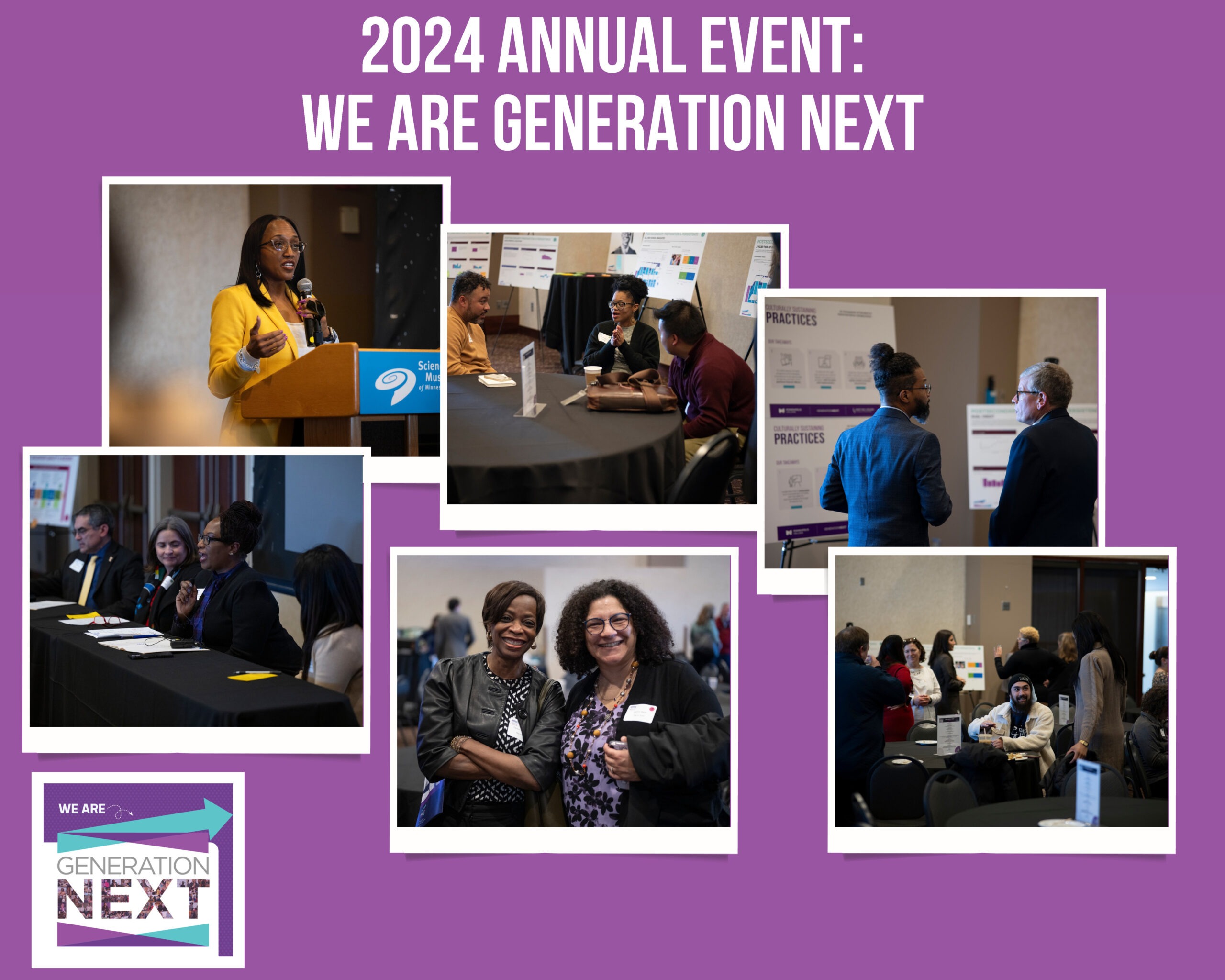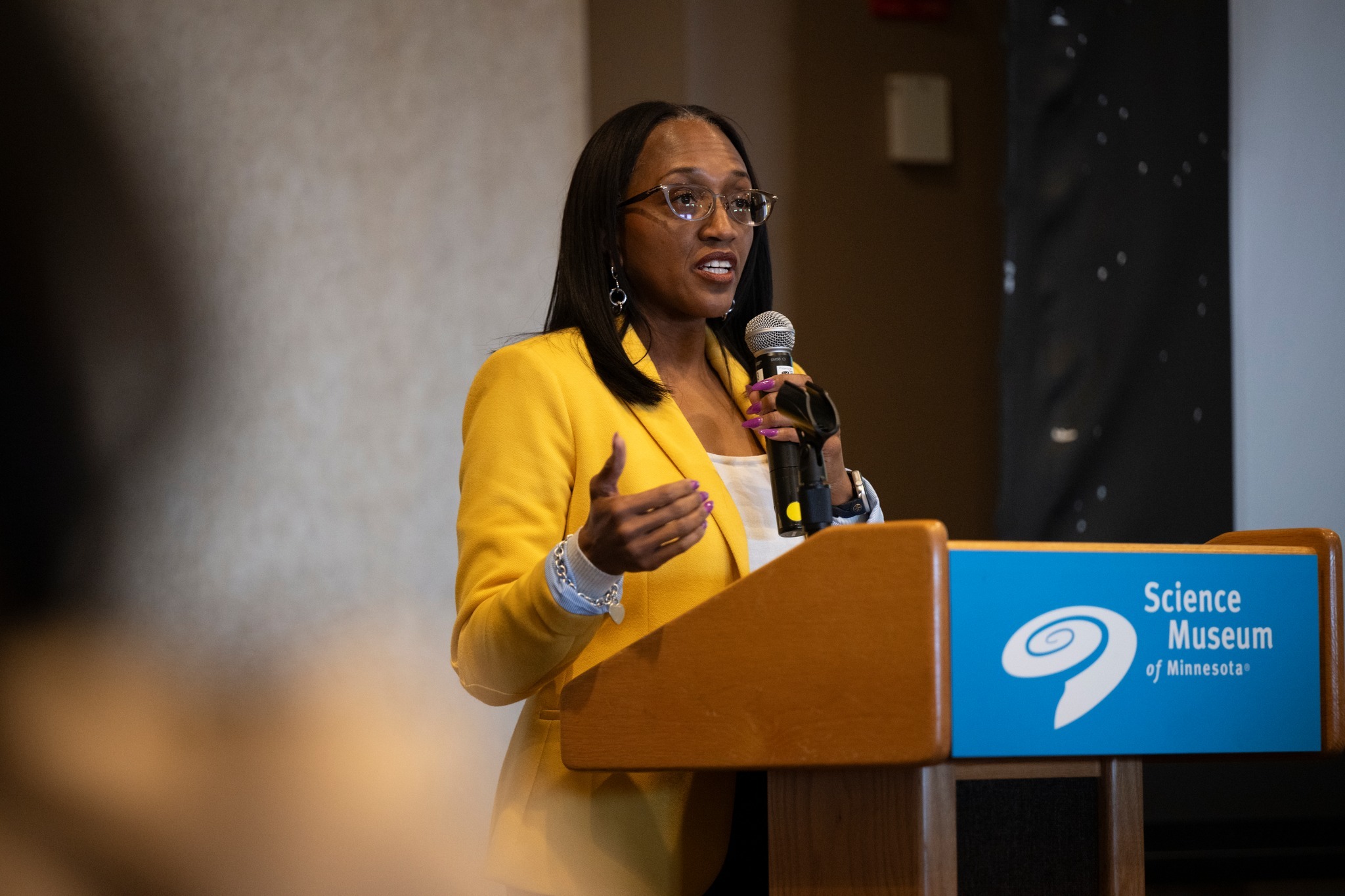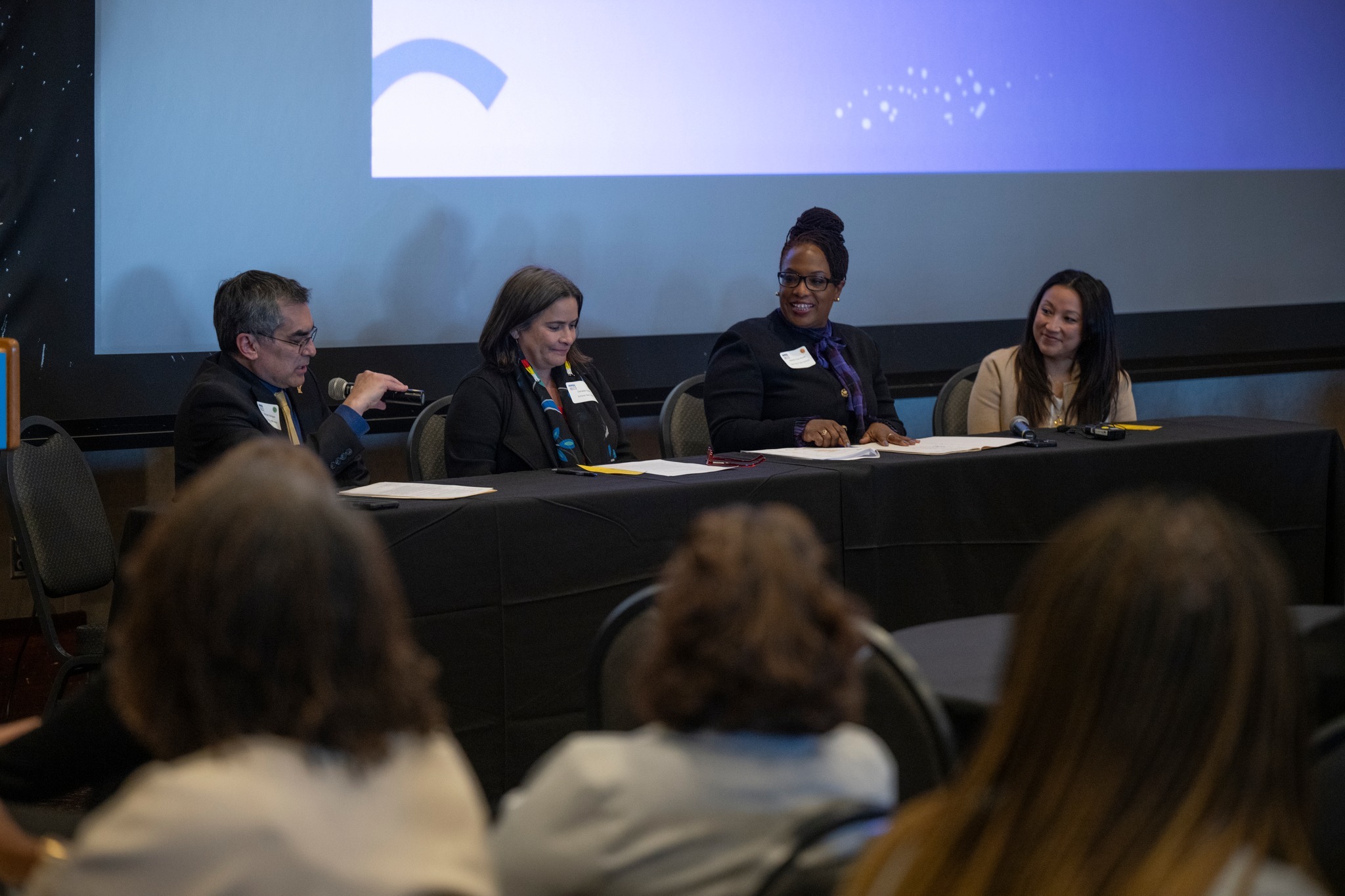
On Thursday, March 28, 2024, Generation Next hosted our 2024 Annual Event at the Science Museum of Minnesota. We welcomed over 100 attendees, representing over 50 organizations. The day began with a Data Walk showing and discussing the shared work happening through Generation Next in our three priority areas: Early Childhood Quality & Access, Teacher Diversity & Teaching Diverse Learners, and Postsecondary Preparation & Persistence.
Opening Remarks – Dr. Lisa Sayles-Adams, Superintendent of Minneapolis Public Schools (MPS)
We were excited to welcome the new Minneapolis Public Schools (MPS) Superintendent and new Leadership Council co-chair, Dr. Lisa Sayles-Adams, to give opening remarks at the event. Dr. Sayles-Adams shared her excitement with becoming the new Superintendent – she said: “I actually started my career in Minneapolis as a teacher more than 28 years ago. So, being able to be the superintendent of Minneapolis Public Schools is super exciting – I’m on cloud nine.”

Dr. Sayles-Adams said that she has been connecting with students, teachers, and families at MPS: “I’ve gone into our schools and I’ve seen our dedicated teachers and our students who have strong relationships with their teachers, and proud parents, and everyone is optimistic about where [MPS] is going to go.”
MPS CTE Program
Dr. Sayles-Adams shared some updates surrounding Career & Technical Education (CTE) in Minneapolis Public Schools, including that MPS has 16 different CTE pathway programs with three different learning models for students to ensure that they have equitable access to the programs. The different pathways include options like agriculture, business, computer programming & cybersecurity, construction engineering, health care, law, public safety, media arts, and robotics – among others. MPS has three different CTE centers that they can access – at North High School, Edison High School, and Roosevelt High School.
“I want to ensure that students have access to quality programming,” Dr. Sayles-Adams said. “We want to make sure that we are giving our students access to skills, so that if they decide to go into the job market [after high school], they’re ready, and they will earn a livable wage. We hope that they will then remain in the city and reinvest in our district.”
Dr. Sayles-Adams ended her remarks by telling attendees about listening events she will be hosting as Superintendent, and shared the three guiding questions she will ask: 1) What excites you about MPS? 2) What is one thing that is working well in MPS? And 3) If you were the superintendent, what would you change first?
Dr. Sayles-Adams said that she is thinking about her role as a superintendent as a leader in the community. “A few values I think are really important are partnership and collaboration – being that leader that puts students at the center.”
Keynote Speaker – Dr. Michael Rodriguez, Dean, College of Education & Human Development, University of MInnesota – Twin Cities
The 2024 Annual Event’s keynote speaker was Dr. Michael Rodriguez, Dean of the College of Education & Human Development at the University of Minnesota – Twin Cities. Dr. Rodriguez is also a member of the Generation Next Data Committee, and has been a longtime partner of Generation Next. Dr. Rodriguez’s presentation, “Let’s Be Student Centered: Understanding Minnesota Student Survey Results,” was a summary of social-emotional data from all of the schools in Minneapolis and St. Paul who participated in the Minnesota Student Survey during the years of 2013, 2016, 2019, and 2022.
“Youth have an inherent capacity for positive development. That capacity is enabled and enhanced through multiple meaningful relationships, contexts, and environments where [the] community is a critical delivery system. Youth are major actors in their own development,” Dr. Rodriguez said.
Going deeper into the background of social-emotional learning’s importance, Dr. Rodriguez said: “Learning, of course, is a social activity and has always been where cognitive development and identity development co-occur; they are intertwined. We cannot separate them. We cannot be successful if we ignore one over the other.”
“The evidence regarding the importance of social and emotional learning is substantial, and it’s acknowledged by major research agencies. And, of course, the state of Minnesota has developed guidance around social-emotional learning as well,” Dr. Rodgriguez said.
Dr. Rodgriguez explained that the three social-emotional skill areas are commitment to learning, positive identity and outlook, and social competence. The three developmental supports are empowerment, family and community support, and teacher and school support.
Dr. Rodgriguez gave some background on the percentage variances for the data he would share, overall stating that “The vast majority of school differences can be explained by the demographic composition of the schools. So when we see differences in MCA scores and schools in Minnesota, it is a function of racial segregation and oppression.” Dr. Rodriguez said that when we look at the social-emotional measures, like academic measures, very little of the variance occurs between schools – almost all of the variation is within schools.
Here are some high-level takeaways from the data that Dr. Rodriguez shared. For his full presentation, click HERE.
- Less than 60% of students in Minneapolis & St. Paul say that they are perceiving a positive level of teacher support
- About a quarter of students have none of the three social-emotional skills, and about a quarter have all three. For the students who have none of the skills, they have almost a full grade point average less than the students who have all three.
- There is a 30% increase in students having goals of going to college if they go from having none to having all three social-emotional skills.
- Students who have all three supports have less than half the rate of substance use and less than half the level of mental distress.
- There is a consistent increase in students who participate in after-school activities if they have all three social-emotional supports.
Panel Discussion
Dr. Rodriguez was then joined for a panel discussion which featured Dr. Stacey Gray Akyea, Executive Chief of Equity, Strategy, and Innovation at St. Paul Public Schools (SPPS); Danielle Grant, President & CEO, Achieve Twin Cities; and Maira Rosas-Lee, Minnesota Student Survey & Statewide Longitudinal Education Data System (SLEDS) Coordinator at the Minnesota Department of Education (MDE).
Dr. Rodriguez began the panel discussion by asking the panelists to speak more about their role and to share some of the challenges that they see students face in school.

Dr. Gray Akyea shared that her work in her role as Executive Chief of Equity, Strategy, and Innovation at SPPS is dedicated to knowledge management. “I think of our division [at SPPS] as the place where we collect the data, analyze and report on the data, and support the core learning and teaching work of the district in ways that are data informed. I love the interaction with all aspects of our district,” she said.
Dr. Gray Akyea said that she recently participated in nine days of equity work through the district, where high school students were selected randomly to spend a day with the superintendent and senior leaders to share about their experiences in SPPS. The first thing that she shared was that students face incredible challenges around how people interpret their race, identity, and ethnicity. She also shared that students see connections with each other and adults in schools as a major aspect of their school identity.
Maira Rosas-Lee, a member of the Generation Next Data Committee, shared more about her role at MDE: “I coordinate the Minnesota student survey and SLEDS within MDE. Both of these are inter-agency projects, and so I get to work with tons of different state agencies and different partners.” Maira echoed what Dr. Gray Akyea said about positive relationships being essential for students: “When communities have positive relationships between students and adults, it’s inviting these young people into an opportunity they might not have had otherwise. It’s involving them in discussions that you think they may not have interest in talking about – like budgets and programming.” By having young people in the room, Maira said that it builds an opportunity for students to have connection and build relationships with adults, which in turn builds trust to listen to one another.
Danielle Grant, a longtime member of the Generation Next Leadership Council, shared more about her role as CEO of Achieve Twin Cities: “We provide career and college readiness services in both MPS and SPPS. We’re in 28 high schools across the two districts. We’re working with about 18,000 high school students every single year. I have a lot of experience in partnering with community,” Danielle said, sharing that she has previously held roles as an administrator at MPS and as the former director of Indian Education at MPS.
Danielle also stated the importance of community for students: “I think it’s time for everyone to really care about young people and identify how they can collaborate and what we can do [for them] – these students are all of our responsibilities.”
Danielle said that when students can feel the interest of adults in collaborating with them, they are able to build trust and want to further engage with the adults in the school systems they participate in.
Dr. Rodriguez later asked the panelists, “Given increasing budget constraints, how can we ensure that all students have access to high quality SEL development opportunities?”
Danielle Grant shared that we need to make sure we are honoring the contributions and work of the people who are on the front line of education – like teachers. “I think collaboration makes things more sustainable, because it’s not dependent on one partner.” Danielle also shared that this model of collaboration is why she has been at the Generation Next table for over a decade. She said: “It’s about coming together and building relationships so we are there for one another.”
Dr. Rodriguez ended the panel by asking each panelist to give an “ask” of the audience at the event.
Maira said: “My ask is for everyone in the room – for leaders all across the state – is to look at how you convey these messages back into your communities so that your schools and districts also participate in the student survey.” Maira shared that one of her takeaways from Dr. Rodriguez’s presentation is asking the question of how do we get these data back into the hands of schools?
Dr. Gray Akyea said that her ask is to remind others that: “We know that learning and identity go hand in hand. When students hit barriers, we should lean into them and remember that we’re the adults who can interrupt those barriers.”
Danielle said: “My ask is for folks to think creatively. Our mission is our students and the outcomes that we want to see for them.” Danielle stressed that adults need to think creatively especially in the timeline we’re in. She said we need to start asking: what can we do differently?
Breakout Rooms – Priority Areas
After the panel discussion, meeting attendees self-selected into three breakout rooms by priority area: Early Childhood Quality & Access, Teacher Diversity & Teaching Diverse Learners, and Postsecondary Preparation & Persistence. These breakout rooms were a way for attendees to learn more about Generation Next’s priority areas and priority area project teams, as well as connect with one another and learn about the upcoming work in each priority area.
One of Generation Next’s spring interns from the RightTrack program in St. Paul, Christina, shared some reflections on the postsecondary breakout room.
We would like to thank our speakers, panelists, Data Docents, other volunteers and all those who attended our 2024 Annual Event! We look forward to connecting over the next year as a coalition. Please reach out to a member of the Generation Next staff if you would like more information on how to become involved with Generation Next – through our Leadership Council, Data Committee, and/or our Priority Area Project Teams. The work of collective impact could not be done without you. We thank you all for your partnership!
